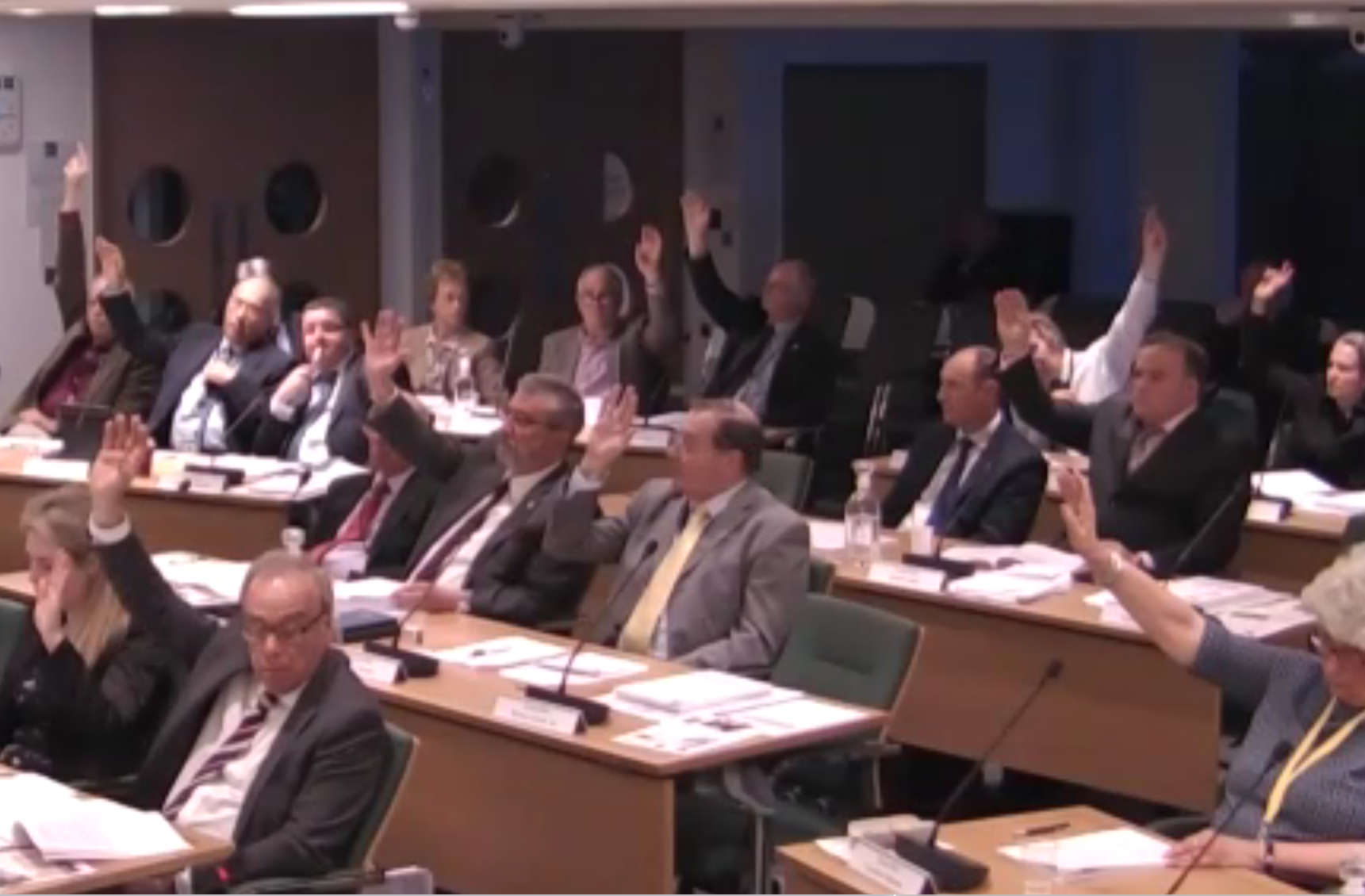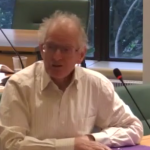 Abraham Lincoln
If given the truth, the people can be depended upon to meet any national crisis...
Abraham Lincoln
If given the truth, the people can be depended upon to meet any national crisis...
 Guildford news...
for Guildford people, brought to you by Guildford reporters - Guildford's own news service
Guildford news...
for Guildford people, brought to you by Guildford reporters - Guildford's own news service
Parties Split As Council Decides to Reform Planning Committee
Published on: 12 Apr, 2017
Updated on: 12 Apr, 2017
Divisions emerged in both major political parties yesterday evening (April 12) during a debate on Planning Committee reform at Guildford Borough Council (GBC).
The main change proposed is a reduction in the size of the committee from 23 members to 15 which will prevent each electoral ward being directly represented.
An amendment from Cllr David Goodwin (Lib Dem, Onslow) calling for a deferral of the decision, pending further consultation with parish councils and residents associations, attracted some support from amongst the Tory ranks but the five Tory rebel councillors: Jenny Wicks, Matthew Sarti (both Clandon & Horsleys), Bob McShee (Worplesdon), Dennis Paul (Holy Trinity) and Christian Holliday (Burpham), were too small in number for the amendment to be accepted.
When it came to the main proposal it was Caroline Reeves, the Liberal Democrat leader’s, turn to vote against the rest of her party, all other Lib Dems appeared to vote against the proposed changes as did the three Guildford Greenbelt Group members. The only Labour member present, James Walsh (Stoke), who had voted against the delay amendment supported the main proposal.
Bob Bromham, the planning secretary from Holy Trinity Action Group (HTAG), had earlier addressed the meeting as a member of the public. He said: “During my 15 years as planning secretary for the group I have learnt how important the planning function is as part of the grass roots of local democracy. A planning application is often the first time that residents are in contact with a councillor, or even find out who their councillors are.
“It is frequently stated that councillors are required to only have regard to planning policy. However there is usually scope for some interpretation, for instance, scale and character. Also the principles of localism require that the views of locals are considered – surely this is why we have a committee; it is more than just an administrative function.
“A ward without a full link to the committee will, to some extent, be disenfranchised, and the way in which these unfortunate wards are chosen will inevitably lead to resentment. The suggestion that a councillor for a disenfranchised ward would be allowed to just speak at a meeting is not an acceptable alternative; he will never be considered to have the same status or influence as the actual members of the committee.”
Cllr Jenny Wicks (Con, Clandon & Horsleys), a former lead member for planning, said: “There’s an old saying, ‘If it ain’t broke, don’t fix it!’ The current system we have is understood by residents and for the most part respected by them. They have confidence and trust in its integrity; qualities which can be all too easily destroyed. There have been three previous reviews of the planning committee… all concluded in the end to leave the system as it is and there were good reasons for that.
“The last review was very thorough. Unlike with this review the members visited other councils with other systems, particularly those with fewer members on the Planning Committee. Members on our reviewing group were impressed by the sterility of the debate and occasionally on the lack of local knowledge.
“Presumably something has gone very wrong to justify an urgent change now. So what is it? let’s look at the evidence. The only quantitative measure I can think of to judge the quality of the committee’s decision making is to compare the success rate on appeal… smaller committees do not necessarily have a better success rate, some of them have a worse success rate…”
Reflecting on the motivation for the change, Cllr Tony Phillips (Lib Dem, Onslow) said: “A councillor working group, not independent consultants, reviewed the working of the Planning Committee with its stated aim at the start of reducing the number of councillors on the committee. So surprise, surprise, their findings were to reduce the size of the planning committee. It’s what is called working back from the answer.
“Their so called evidence, without further justification, was that other councils have less members. Well so what? This is Guildford and our committee with 23 councillors is working fine as the last planning committee illustrated.”
But Cllr Marsha Moseley (Con, Ash Vale), current chairman of the planning committee, had a different point of view. She said: “I really did not want to speak on this motion tonight but there has been a lot of misinformation going around, so I want to be clear and go back to basics. Just exactly what is the purpose of the Planning Committee?
“The Planning Committee is a regulatory committee and my understanding is that it is a quasi-judicial body… It is obliged to determine facts and draw conclusions to provide a basis for an official action i.e. to determine an application.
“This is a serious function … because the decisions of the Planning Committee are legally binding and may be challenged in a court of law. If this happens it can be very expensive for the council and the tax payer. It is crucial that members who sit on the Planning Committee fully understand their obligations and that they have fully undertaken all the necessary training… A smaller committee will allow just for that…
“…take up for training on planning matters recently has not been the best, to say the least.
“Planning members must arrive at their decisions in an objective and open way and must not under any circumstances base their decisions on party political beliefs, or any other preconceived beliefs and persuasions they may have.
“I also need to make it clear that members are not there to solely represent the views of the ward they were elected to represent, nor the residents associations nor, indeed, the parish councils in their ward. This is one of the biggest misconceptions that has been trotted out in Guildford for some considerable time. All members are there to represent all members of this borough.”
Cllr Susan Parker (GGG, Send) was pessimistic about the change. She said: “The new system will become purely one of political appointment, presumably by the party leader and that means that the party basis will start to become important in the planning decision process and that is utterly reprehensible it is utterly inappropriate and it will lead to a distortion of the planning process.
“It will mean that the views of the Executive will be imposed, can be imposed… and it will not allow for any dissent… At present the decisions do not always follow the lead given by the lead member for planning [council leader Paul Spooner] and that is something this council should cherish.
“If it just becomes a matter of political appointment then local democracy just ceases to operate properly and this just becomes a politburo arrangement…
Cllr David Bilbe (Con, Normandy) focussed on the judicial role of the committee: “If we are a quasi-judicial body… we should apply the facts to the law and policy, as raised by Cllr Moseley, and therefore we have to set aside our personal views and see this as a professional body that makes those judgements on the basis of those laws and policies and anything which streamlines the process and makes it more efficient should be welcomed and therefore I fully endorse and support the proposal.
Cllr Dennis Paul (Con, Holy Trinity) whose absent ward colleague Nils Christiansen had spoken against the proposal in an earlier debate, said: “It’s not often I go against the party but I hope that everyone can see this is a non-party political issue.
“A key tenet of the argument to reduce the committee numbers has been that our local councils have smaller size committees. However relative to their members, these changes would put Guildford at the bottom of the league of representation with 31% of elected members remaining on the planning committee.
“Even expert judgement may give a different interpretation of policy or guidelines so I cannot see how we can assume that members are making the wrong decisions. decision making is an art not a science.”
He concluded: “Lastly I would ask who will be appointed to the new planning committee and on what basis? What is the criteria?”
Concluding the debate, council leader and lead member for planning, Paul Spooner (Con, Ash South & Tongham) said: “I looked at what we are doing in face of some of the concern and I can honestly say that I do not believe that the process that we have run through has weakened this [planning] process for the council in any way or form…
“We have managed between group leaders and deputy leaders of the major parties here to work things out very effectively in the past, in relation to committees, including the Planning Committee, and I see no reason at all why amongst the groups we can’t achieve that.
“I find it very disappointing that the impression is given, once again, by the leader of the Greenbelt Guardians [sic] that in some way this is a leader run scheme. It couldn’t be further from the truth, in fact this came to me initially from officers as well as the planning chairman and Cllr Furniss from a governance perspective.”
The amendment proposing a delay was defeated by 26 votes to 17 and the main proposal was passed by 27 to 14 with 2 abstentions. 43 of GBC’s 48 council members were present.
Interest is now likely to focus on which councillors will remain on the reduced committee and how the selection will be explained. Council leader Spooner might feel pressurised into retain some councillors such Jenny Wicks, Nils Christiansen and Bob McShee who have reputations for independence in planning matters and spoke against the changes.
Review of the changes will be conducted after 12 months.
A webcast of the full debate can be found here.
Responses to Parties Split As Council Decides to Reform Planning Committee
Leave a Comment Cancel replyPlease see our comments policy. All comments are moderated and may take time to appear.
Recent Articles
- Guildford Institute’s Crowdfunding Project for Accessible Toilet in its New Community and Wellbeing Centre
- Letter: Guildford – Another Opportunity Missed?
- Letter: GBC’s Corporate Strategy – Where Is the Ambition?
- My Memories of John Mayall at a Ground-breaking Gig in Guildford Nearly Six Decades Ago
- Westborough HMO Plans ‘Losing the Heart of the Street’ Says Resident
- College Invests to Boost Surrey’s Economy and Close Digital Skills Gap
- Community Lottery Brings Big Wins for Local Charities
- GBC Housing Plan Promises ‘A Vibrant Urban Neighbourhood’ Near Town Centre
- Hospital Pillows ‘Shortage’ at the Royal Surrey
- Updated: Caravans Set Up Camp at Ash Manor School


Recent Comments
- Ian Macpherson on Updated: Main Guildford to Godalming Road Closed Until August 1
- Sara Tokunaga on GBC Housing Plan Promises ‘A Vibrant Urban Neighbourhood’ Near Town Centre
- Michael Courtnage on Daily Mail Online Reports Guildford Has Highest-paid Council Officer
- Alan Judge on GBC Housing Plan Promises ‘A Vibrant Urban Neighbourhood’ Near Town Centre
- John Perkins on GBC Housing Plan Promises ‘A Vibrant Urban Neighbourhood’ Near Town Centre
- S Collins on GBC Housing Plan Promises ‘A Vibrant Urban Neighbourhood’ Near Town Centre
Search in Site
Media Gallery
Dragon Interview: Local Artist Leaves Her Mark At One of England’s Most Historic Buildings
January 21, 2023 / No Comment / Read MoreDragon Interview: Lib Dem Planning Chair: ‘Current Policy Doesn’t Work for Local People’
January 19, 2023 / No Comment / Read MoreA3 Tunnel in Guildford ‘Necessary’ for New Homes, Says Guildford’s MP
January 10, 2023 / No Comment / Read More‘Madness’ for London Road Scheme to Go Ahead Against ‘Huge Opposition’, Says SCC Leader
January 6, 2023 / No Comment / Read MoreCouncillor’s Son Starts Campaign for More Consultation on North Street Plan
December 30, 2022 / No Comment / Read MoreCounty Council Climbs Down Over London Road Works – Further ‘Engagement’ Period Announced
December 14, 2022 / No Comment / Read MoreDragon Interview: GBC Reaction to the Government’s Expected Decision to Relax Housing Targets
December 7, 2022 / No Comment / Read MoreHow Can Our Town Centre Businesses Recover? Watch the Shop Front Debate
May 18, 2020 / No Comment / Read More


















Jules Cranwell
April 12, 2017 at 6:15 pm
Another blatant and cynical strong arm tactic by the Executive. Just reduce the planning committee to a handful of the leader’s yes men/women, and job done.
The electorate is not so stupid as to think otherwise.
Paul Duggen
April 13, 2017 at 11:40 am
Anyone who has followed the Planning Committee decisions recently could easily come to the conclusion that the Executive at GBC have not been getting their way and have therefore decided to whittle out the dissenters.
As a local resident in the past I have sought advice from my local councillor on a planning matter only to be told that he could not give any advice as it would prejudice his position so I’m not sure having a local councillor necessarily helps you fight your corner if you’re an applicant. They seem only too happy to side with those opposed but I suppose that’s what keeps them in office.
As a council tax payer what riles me most is the number of refusals, turned over on appeal. This wastes a huge amount of tax payers’ money as expensive consultants, even QC’s are called in to defend the councils decision, not forgetting either, the wasted time and stress and unrecoverable extra costs the applicant has to go through to appeal.
If Guildford Boroughs planning committee were serious about getting their decisions right and saving tax payer money they would put this thought foremost in their minds when determining applications contrary to their professional planning officer recommendation.
They should also publish their appeal statistics, compared to the national averages, in their council newsletter to show us how well their doing.
Jim Allen
April 13, 2017 at 12:12 pm
A sad day for democracy. The case for change is not proven.
Gordon Bridger
April 14, 2017 at 9:42 am
Mr Duggan rightly complains about his councillor refusing to comment on a planning application as he will be accused of “predetermination”. Councillors have been badly misadvised by their officials and developers that they must not utter a word about an application before their Officers do so.
This interpretation has been condemned by the government in their advice on the implementation of the Localism Act but has been ignored by council advisers.
While reasons for objection need to relate to planning policies and guidelines any intelligent councillor knows what these are and also that they can be subject to genuine differences. If uncertain they can ask officers to give them reasons for refusal.
I have produced a report on this which Mr Duggan can have if he contacts me.